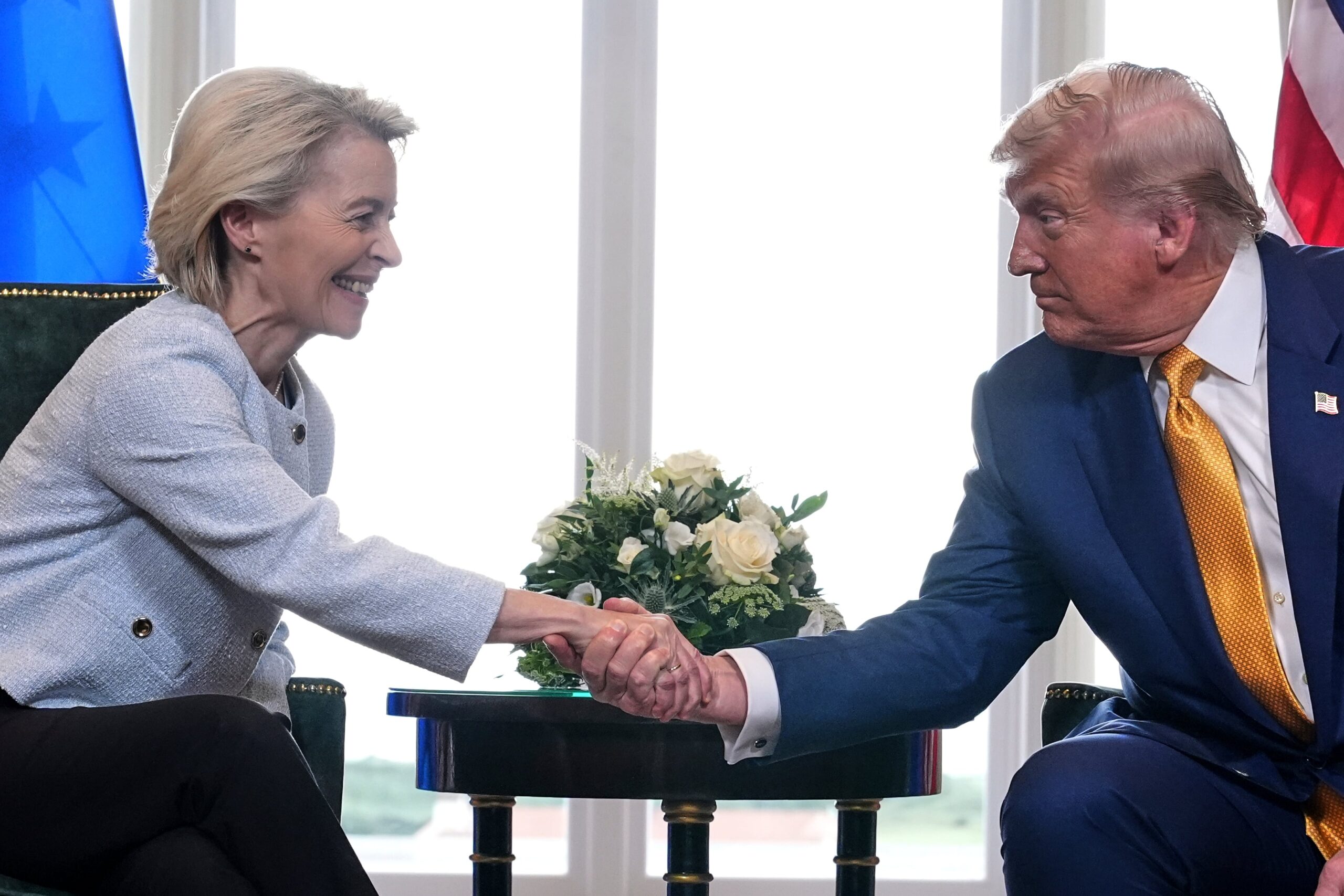FRANKFURTThere are differing opinions about the trade deal between the Trump administration and the European Union. According to EU officials, they prevented a complete economic catastrophe. However, the pact is dangerously ambiguous, according to experts, and French officials in particular claim the EU punched below its weight.
There is no agreement on rates for important sectors like steel and pharmaceuticals, but the pact leaves Europe with a 15% tax on the majority of goods imported into the United States, with other categories of items being tariff-free.
Suggested Videos
What they’re saying is as follows:
The European Commission
EU chief trade negotiator Maro ef ovi stated that a 30% tax warned by U.S. President Donald Trump would have been imposed if an agreement had not been reached by the deadline of August 1.
Instead of a tit-for-tat escalation that may have seen retaliatory EU duties on 93 billion euros ($108 billion) worth of commodities, including U.S. agricultural products, steel, and chemicals, European officials primarily sought a negotiated compromise.
Some people may find a trade war alluring, but there are severe repercussions, including at least a 30% tariff, according to Efovi. Our transatlantic trade would essentially stop, endangering about 5 million jobs in Europe, especially those in small and medium-sized businesses.
“We have received a unified message from our businesses: steer clear of escalation and strive for a solution that provides immediate relief,” he said.
France: A gloomy day
Major exports to the United States include wine and alcohol, luxury leather items and perfumes, pharmaceuticals, and aircraft.
Senior French officials denounced the agreement Monday, with Strategy Commissioner Clément Beaune cautioning that it minimized the economic might of the 27-nation bloc and Foreign Trade Minister Laurent Saint-Martin calling for a European response in the services sector.
According to Saint-Martin on France Inter radio, the good news is that an agreement has been reached that gives our companies stability and visibility in the transatlantic trading relationship. However, this deal is unbalanced, and we will have to continue our efforts.”
One important front in the trade gap, he said, is digital services. Although he was just discussing products, Donald Trump spent months claiming he wanted to rebalance a trade relationship that hurts the US. The opposite is true when it comes to services. Therefore, he continued, it is now our responsibility to perform the force and rebalancing work.
According to Saint-Martin, the United States chose to employ force in order to impose a new law of the jungle that disregards the decades-old regulations governing international trade.
This agreement is unfair and imbalanced, according to Beaune, France’s high commissioner for strategy and planning, who made this statement on Franceinfo radio. Europe did not use its might, he said. We are the most powerful trade nation in the planet.
Beaune stated, “When you look at it, the glass is three-quarters empty and a quarter full.”
More harshly, Prime Minister Franois Bayrou said on X: It is a bad day when a coalition of free peoples, united to protect their interests and uphold their ideals, submits.
Germany: Preventing needless escalation
Three main exports to the United States are industrial machinery, pharmaceuticals, and automobiles.
After weeks of back-and-forth threats in heated negotiations with Trump administration officials, German Chancellor Friedrich Merz stated that the agreement would provide businesses with a more stable environment to plan and invest, which is a major EU objective.
“The agreement between the USA and Europe is good because it prevented an unneeded escalation in transatlantic trade relations,” he remarked. “Even if I would have hoped for more relief in transatlantic commerce, we have managed to maintain our fundamental objectives.
When asked if German business had reacted negatively to the accord, Merz said that some sectors and companies had expressed relief.
However, Merz stated that he had stated repeatedly prior to the agreement that there would be an asymmetric deal, if there is one at all, and that it is evident to him that the current tariffs, particularly the 15% against 0% for imports to the European Union, represent a substantial burden for the Federal Republic of Germany’s export-oriented economy.
Italy: Good result
Automobiles, agricultural products, and industrial machinery are the main exports to the United States.
The announcement of the tariff accord was greeted by Italian Premier Giorgia Meloni, who has positioned herself as a mediator between the Trump administration and Europe, as a good result that prevented an unforeseen and potentially disastrous trade war.
However, she stated that specifics still needed to be worked out and that she is still unsure of what exclusions are carved out for specific businesses in remarks to reporters on the sidelines of a U.N. food security meeting in Addis Ababa, Ethiopia.
“A trade escalation between Europe and the United States would have unpredictable, potentially devastating consequences,” she added, echoing her own thoughts.
Given Italy’s wine exports in particular, Meloni stated that she needed to know what the exemptions might be, including those pertaining to agricultural products.
I’m not sure exactly what we mean when we talk about investments and gas purchases, therefore there are a lot of other things that are also lacking.”
She pointed out that there is, in theory, still room for dispute because the agreement as it stands is technically nonbinding.
Hungary: Trump had breakfast in the EU
Batteries and packaged medications are the main exports to the United States.
A Trump supporter who has acquired support within the MAGA movement, Hungarian Prime Minister Viktor Orbán, denounced the deal on Monday as a failure of Europe’s leadership.
In a video conversation with the spokesman for his party, Orb stated, “It is clear to me even at first glance that this is not an agreement.” That’s what happened: Donald Trump had breakfast with Ursula von der Leyen, the president of the European Commission.
Orb, a regular opponent of the EU, has mostly criticized the bloc for failing to get a comprehensive tariff agreement with Washington, rather than criticizing Trump’s government for its trade policies.
Orb said that a trade agreement between the United States and the United Kingdom, which placed a 10% general tariff on British goods, was preferable than the one reached with the European Union.
According to Orbn, the American president is a heavyweight negotiator, whereas von der Leyen is a featherweight. It will be challenging to sell the European deal as a triumph because it is worse than the British one.
Economists: Many gaps, less growth
Harrison, Jon, at TS Lombard: It should come as no surprise that trade agreements reached under duress in a matter of weeks, as opposed to the customary years of meticulous negotiation, leave a great lot of information vague and subject to interpretation.
Jack Allen-Reynolds, Capital Economics’ deputy chief economist for the eurozone: The GDP (gross domestic product) of the EU is expected to decline by roughly 0.5% as a result, which is worse than we had anticipated.
For the time being, the agreement has prevented a far worse conclusion, but it is unclear if this will continue.
The agreement reached yesterday is appeasement, not a fair deal, according to Julian Hinz, a trade researcher at the Kiel Institute for the World Economy.
By rejecting the tenets of the multilateral, rules-based global trading system of the World trading Organization, the EU may be able to avoid a trade war in the short term, but it will pay a heavy price in the long run.
___
Nicole Winfield reported from Rome, Thomas Adamson from Paris, and Justin Spike from Budapest, Hungary. This report was written from Brussels by Sam McNeil.








